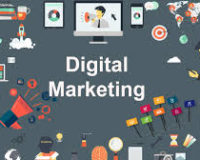With the growth of social networks, people are getting hooked to devices. From mobile devices, desktops, or laptops. The lure is keeping in touch — no intention of missing anything.
The Internet is hard to ignore. And marketing has evolved with the trend. Remember, a good marketing campaign has to interact with the right people at the right time.
More people are online. Online shops are in existence. Hence the need for a strategy to leverage potential consumers. The plan is digital marketing.
Digital Marketing
Digital marketing may sound fancy. But it is nothing but marketing done via the internet. It does not conform to the old systems of marketing. Business is now leveraging clients via digital channels.
The search and conversion of clients are in digital forms, for example, Google, social media apps, websites, and emails.
With digital marketing, options and strategies are vast. Creativity is top-notch. One can work within a set budget and campaign with different statistics.
Digital marketing works for both individuals and organizations. The budget of the campaigns depends on the individual.
When it comes to ROI, for digital marketing, it is measurable. With the old forms of marketing, it was not easy to measure the success of a campaign. The various marketing tactics of digital marketing there has been developed different analytic tools.
Examples of Digital Marketing
Search Engine Optimization
Best suited for websites. It involves optimizing the website to rank higher in search engine results. The main target is organic traffic to the website.
SEO is approached through; On-page SEO, Off-page SEO, and Technical SEO.
For the first, the focus is on the content existing on the website. The intent for the keyword used during the search helps answer questions asked by readers. Hence increase in ranking of search engine results pages.
Off-page SEO focus is on activities not on the website but affects the ranking. It is advisable to network with others who help build backlinks. It will attract the right external attention. And automatically improve the ranking.
With technical SEO, it’s crucial for Google. The focus is on the coding of pages, for example, image compression, structured data, and file optimization. They all help increase website loading speed.
Content Marketing
The focus is on content creation and marketing. To create brand awareness, traffic growth, and lead generation. The channels convenient are blog posts, ebooks, and infographics.
Social Media Marketing
To promote the brand through all social platforms. The main target is usually to increase traffic and generate leads. Some of the platforms are easily integrated for easy scheduling and posting. A perfect example is Facebook and Instagram.
Pay Per Click
The most common is Google Ads. The traffic is driven through a click of the ad. There is an option of paying for top slots on the Google search engine.
PPC is also used on Facebook, Twitter, and sponsored messages on LinkedIn.
Email Marketing
Use of emails to promote content, discounts, events, or direct people towards business websites.
Affiliate Marketing
It’s performance-based. One receives a commission after promoting a product or service on the website. One can also post the affiliate links via social media accounts.
Digital Marketing in Kenya
With the industry expanding, Kenya has also taken a piece of the pie in digital marketing. Anyone with a background in marketing or an entrepreneur looking to grow a brand will find the digital marketing course viable.
It introduces and guides on how to drive brand awareness and lead generation. The course covers all the different channels of digital marketing.
It aids the individual in being able to develop Key Performance Indicator across the channels used. On top, the course covers the measurement of performance across different channels.
The digital marketing course guides one on which area to specialize. Below are some specialist areas in digital marketing;
Specialist in the Digital Marketing Industry
SEO Manager
The focus is to get the company website to rank. In the position, one works with content creators. As a manager, one ensures the content produced is performing. And to brainstorm on better content.
Content Marketing Specialist
Mostly couple up as digital content creators. The leading role is to come up with a content calendar. They also support new products with the right promotional content.
Social Media Manager
The role is as per title. Different companies choose a social network depending on the industry. The leading role is to create a posting schedule. As the manager, he or she advise on which content to post and on which network.
Of importance to note is specialization depends on the size of the company. A small company may need one digital marketing specialist, whereas a big establishment may create a different post for the department.
Which Business are Viable for Digital Marketing?
Before enrolling for the digital marketing course, one may conflict whether his or her area of career or industry in need of a digital marketer. Of importance to note is that all business requires customers.
And in digital marketing, the consumers are leveraged via online content. The idea is to learn is which channels will leverage the target consumers. For example;
- B2B Approach
For a company with business to a business model, the digital marketing tactic will focus on lead generation. To get customers who will call for an inquiry.
The focus is on the website. To generate more organic traffic. On top, the social media account convenient will be LinkedIn.
- B2C Approach
The channel is business to consumers. The main target is consumers who buy products. Apart from lead generation, one may require active Call to Action by consumers.
The consumer journey is the main focus. The channels most viable are social media channels and website.
At the end of the digital marketing course, one knows to measure return on investment (ROI). In the digital marketing course, there is guidance on the different analytic tools. They show real-time info.
And hence guides on the best channels to promote content and changes in marketing strategies.




